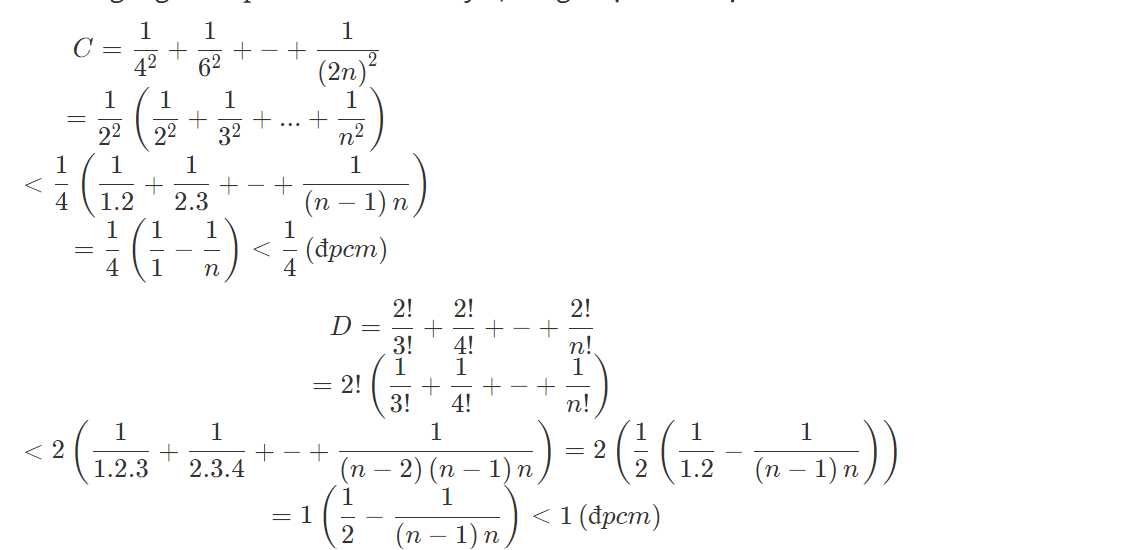bài 1:tìm min A=\(\dfrac{5x^2-12x+8}{\left(x-1\right)^2}\)
bài 2: chứng minh với mọi n\(\in\)N* và n\(\ge\)3:
\(\dfrac{1}{9}+\dfrac{1}{25}+...+\dfrac{1}{\left(2n+1\right)^2}< \dfrac{1}{4}\)
bài 3: tìm min, max của A=2x+3y biết \(2x^2+3y^2\le5\)
bài 4: tìm min của B=\(\sqrt{x-1}+\sqrt{5-x}\)
và A=\(\sqrt{x^2+x+1}+\sqrt{x^2-x+1}\)


Bài 3:
Áp dụng BĐT Bunhiacopxky ta có:
\((2x+3y)^2\leq (2x^2+3y^2)(2+3)\)
\(\Leftrightarrow A^2\leq 5(2x^2+3y^2)\leq 5.5\)
\(\Leftrightarrow A^2\leq 25\Leftrightarrow A^2-25\leq 0\)
\(\Leftrightarrow (A-5)(A+5)\leq 0\Leftrightarrow -5\leq A\leq 5\)
Vậy \(A_{\min}=-5\Leftrightarrow (x,y)=(-1;-1)\)
\(A_{\max}=5\Leftrightarrow x=y=1\)
Bài 4:
Lời giải:
\(B=\sqrt{x-1}+\sqrt{5-x}\)
\(\Rightarrow B^2=(\sqrt{x-1}+\sqrt{5-x})^2=4+2\sqrt{(x-1)(5-x)}\)
Vì \(\sqrt{(x-1)(5-x)}\geq 0\Rightarrow B^2\geq 4\)
Mặt khác \(B\geq 0\)
Kết hợp cả hai điều trên suy ra \(B\geq 2\)
Vậy \(B_{\min}=2\).
Dấu bằng xảy ra khi \((x-1)(5-x)=0\Leftrightarrow x\in\left\{1;5\right\}\)
---------------------------------------
\(A=\sqrt{x^2+x+1}+\sqrt{x^2-x+1}\)
\(\Rightarrow A^2=2x^2+2+2\sqrt{(x^2+x+1)(x^2-x+1)}\)
\(\Leftrightarrow A^2=2x^2+2+2\sqrt{(x^2+1)^2-x^2}=2x^2+2+2\sqrt{x^4+1+x^2}\)
Vì \(x^2\geq 0\forall x\in\mathbb{R}\)
\(\Rightarrow A^2\geq 2+2\sqrt{1}\Leftrightarrow A^2\geq 4\)
Mà $A$ là một số không âm nên từ \(A^2\geq 4\Rightarrow A\geq 2\)
Vậy \(A_{\min}=2\Leftrightarrow x=0\)